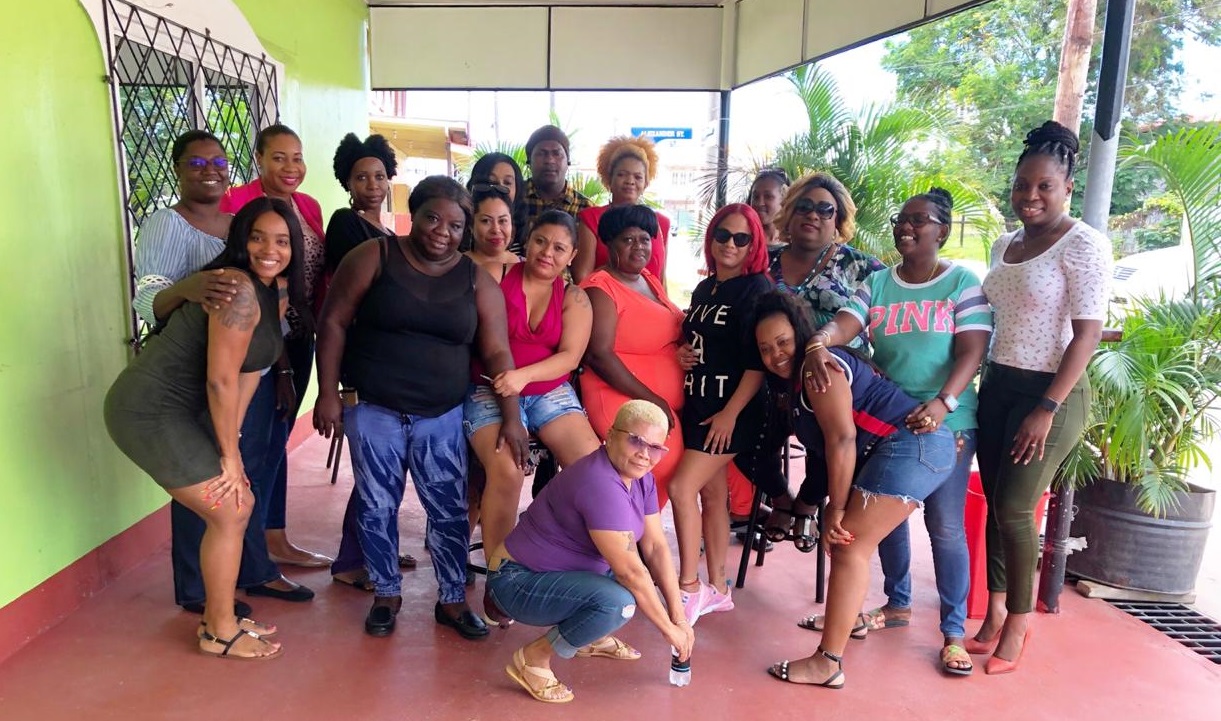
Capacity building for Regional Civil Society focused on sex workers hosted in Guyana
Image: Facilitators and participants of the Caribbean Sex Work Coalition (CSWC) capacity building initiative
The Caribbean Sex Work Coalition (CSWC) recently trained 15 members from six of its member countries. Sex Workers from Belize, Barbados, Guyana, Jamaica, Republic of Trinidad and Tobago and Suriname participated in a three-day Sex Worker Implementation Tool (SWIT) workshop followed by a two-day Organisational Management Training aimed to build the capacity of sex workers to manage their civil society organisations efficiently.
According to Co-chair and Coordinator, CSWC, Miriam Edwards, three days of training were dedicated to building the capacity of sex workers to monitor and evaluate their progress in following the guidelines specified by the SWIT. The SWIT offers practical guidance on effective HIV and STI programming for sex workers. It provides evidence for the necessity of decriminalisation of sex work, the involvement of sex workers in developing policy, and the empowerment and self-determination of sex working communities as a fundamental part of the fight against HIV. SWIT was created by the World Health Organization (WHO) and is based on WHO’s 2012 recommendations on HIV and Sex Work.
The SWIT training was supported by the Robert Carr Civil Society Networks Fund (RCNF).
Following the SWIT training, participants were involved in two days of capacity building focused primarily on Financial Management and the Principles of Good Governance. Participants were exposed to the basics of financial management through several practical exercises that included preparing budgets for their organisations, creating vouchers for payments, distinguishing between an invoice and a quotation, understanding the importance of accountability as well as the need for correct documentation for payments.
The Principles of Good Governance and Board Development were also critical elements of the training course. Participants had the opportunity to take part in several leadership exercises. This initiative was funded by the Caribbean Coalition for Vulnerable Communities (CVC).
WHAT IS PANCAP?
PANCAP is a Caribbean regional partnership of governments, regional civil society organisations, regional institutions and organisations, bilateral and multilateral agencies and contributing donor partners established on 14 February 2001. PANCAP provides a structured and unified approach to the Caribbean’s response to the HIV epidemic, and coordinates the response through the Caribbean Regional Strategic Framework on HIV and AIDS to maximise efficient use of resources and increase impact, mobilise resources and build the capacity of partners.
What are the Global AIDS Strategy 2021–2026 targets and commitments?
If targets and commitments in the strategy are achieved:
- The number of people who newly acquire HIV will decrease from 1.7 million in 2019 to less than 370 000 by 2025
- The number of people dying from AIDS-related illnesses will decrease from 690 000 in 2019 to less than 250 000 in 2025.
- The goal of eliminating new HIV infections among children will see the number of new HIV infections drop from 150,000 in 2019 to less than 22,000 in 2025.
What are the 95-95-95 Targets for ending AIDS?
- 95% of People Living with HIV know their HIV status;
- 95% of people who know their status on treatment; and
- 95% of people on treatment with suppressed viral loads.
HELPFUL LINKS:
Global AIDS Strategy 2021–2026, End Inequalities, End AIDS
https://pancap.org/pancap-documents/global-aids-strategy-2021-2026-end-inequalities-end-aids/
Caribbean Regional Strategic Framework on HIV and AIDS (CRSF) 2019-2025
https://pancap.org/pancap-documents/caribbean-regional-strategic-framework-2019-2025/
